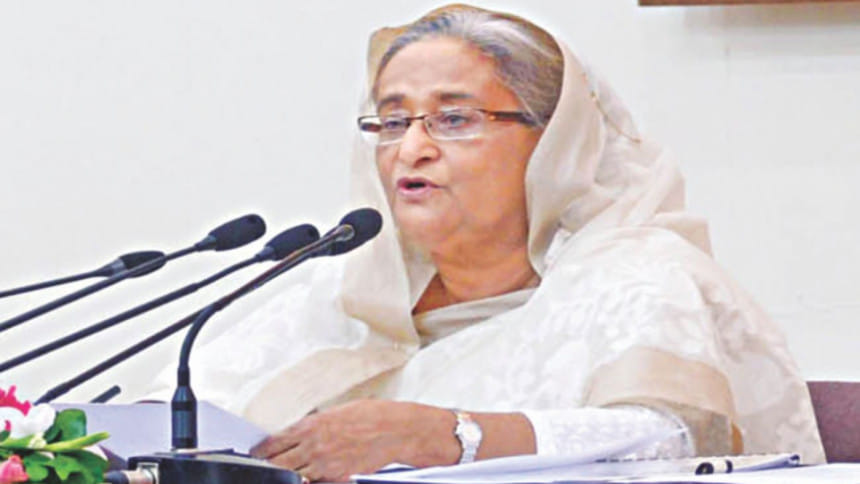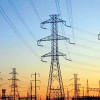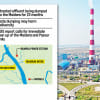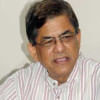Sundarbans to stay safe

Reaffirming her government's resolve to go ahead with the Rampal power project, Prime Minister Sheikh Hasina yesterday said the plant would be set up in such a way that it would not harm the Sundarbans.
The PM was speaking at a press conference at the Gono Bhaban.
Her statement comes at a time when campaigners are pressing for cancellation of the coal-based power plant project which they say would have an adverse impact on the Sundarbans, a Unesco world heritage site.
On August 24, BNP Chairperson Khaleda Zia lent support to the campaigners, saying the project is “anti-people” and “unprofitable”. She urged the government to pull back from the project for the sake of the country's ecological balance.
Hasina said the 1,320MW plant is about 14 kilometres from the outer boundary of the Sundarbans and 65 kms from the world heritage site. And international law permits construction of a coal-based power plant 10 kms from a deep forest, she said.
Rampal project is one of the coal-based plants the government has decided to build across the country to meet the growing electricity demand, said the PM.
“But a vested quarter which is against the country's development has been spreading negative, baseless, fictitious and misleading information for the last few days and is trying to make people fearful of the project.”
The premier said the BNP chief's support for “the propaganda” is an indication of a deep conspiracy, reports BSS.
“Otherwise, why she [Khaleda] has come up with a reaction long after the launching of construction work of the power plant?"
The premier said all the information and data on the project, provided by the BNP chief, are “false, fabricated and misleading”, and that she came up with “false information” to misguide people.
Coal is the most reliable source of future energy as it would be impossible to continue supply of natural gas to the country's gas-based power plants in near future, Hasina noted.
READ: Stop Rampal power project
Developed countries, including the USA, France, Germany, China and Japan, as well as neighbouring India meet about 40 to 98 percent of their electricity demand with coal-based power, she pointed out.
But coal-based electricity accounts for a little more than one percent of power generated in Bangladesh.
About environmental concerns, the PM said ultra supercritical technology would be used at the plant. “We are going to set up a power plant that is equipped with the state-of-the-art technology.
“We will ensure that all available modern technologies are applied there to prevent pollution,” she said, adding that carbon dioxide to be emitted through the 275-metre chimney would remain within a 1.6km radius of the plant.
The density of other gases would be within the permissible limit set by the World Health Organisation and other international agencies. The best quality coal from Australia, Indonesia and South Africa would be used at the plant, said the premier.
The plant would treat used water and cool it down before discharging it into the Pusur river, she said.
The government is aware of emission of light and sound during coal transportation. The emission would be kept at the minimum level, and coal would be brought to the plant site from deep sea by covered barges, said the premier.
The government appointed German group Fishner as project consultant for maintaining the highest international standard in implementing and operating the project, she said.
“There is no scope for raising any question about the quality of work. We will not make any compromise on it [quality],” said the PM.
The country would need 24,000MW power in 2021 and 60,000MW by 2041. In view of this, the government has prepared a roadmap with many long and short-term projects, including quick rental power plants, Hasina said.
India's largest coal power company National Thermal Power Corporation has formed a joint venture -- the Bangladesh-India Friendship Power Company Pvt Ltd -- with Bangladesh Power Development Board on a fifty-fifty basis for setting up the plant.
India's state-run Bharat Heavy Electricals Ltd has won the deal to build the plant. The total cost of the project is estimated at $1.8 billion.
Indian government's external lending arm, the Exim Bank, has backed up BHEL's offer with nearly 70 percent funding of the project cost.
Bangladesh is seeking to diversify energy sources as the reserves for natural gas are fast-depleting.
According to Petrobangla, the country now produces 2,750 million cubic feet of gas per day, with a shortage of more than 500mmcfd. At the current pace of consumption, the country's 13.22 trillion cubic feet of proven and probable gas reserves would last till 2030.
“As gas reserves are depleting, there is doubt whether it would be possible to supply gas to power plants in the future. So, coal is the most reliable source of energy in terms of price and availability,” said the PM.
Referring to yesterday's police operation in Narayanganj, she said the elimination of the mastermind of the Gulshan cafe attack would boost people's confidence, reports BSS.
"We would be successful in rooting out terrorism and militancy if we keep up the ongoing drive against these social menaces and create public awareness against them," she said.

 For all latest news, follow The Daily Star's Google News channel.
For all latest news, follow The Daily Star's Google News channel. 








Comments